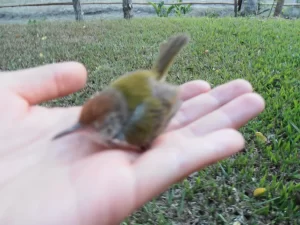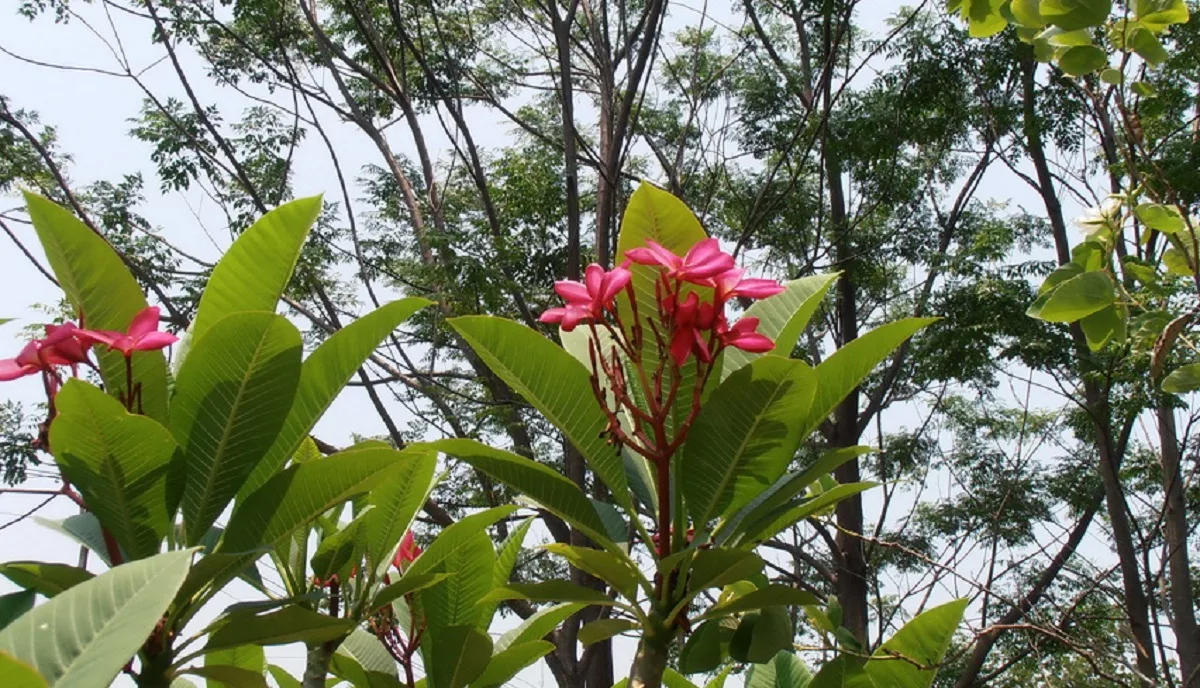The Gift Of Rebirth
“Where is the fountain that throws out these flowers in such a ceaseless outbreak of ecstasy?” – Tagore
One afternoon about a month ago, I looked outside my house after the gardeners had finished cutting the grass and was shocked to see that they had chopped off plenty of healthy plants. The tall plants in the middle of an open area, a number of short palm trees, the lush shrubs around the front of my house protecting my privacy… some of these plants I’d loved so much that I knew their individual leaves… they laid on the ground in piles waiting to be collected and disposed of. I took in the massacre before my eyes.
I was outraged. Bewildered. Saddened. I looked at the piles of long, big leaves, so vibrant their colours reminded me of emerald, and fiery orange-red “birds of paradise”. They had no business being chopped off. I felt violated, and as though I’d lost something precious.
For days, I was upset about this. In my mind, I tried to reconcile with it by thinking that maybe the gardeners knew something I didn’t. That perhaps the rains would make them grow back in no time, fresher and more lush than ever. After all, the plants were starting to dry out in the hot season. Perhaps the gardeners wanted me to enjoy even more beautiful plants when they eventually grew back.
Still, I was angry every time I thought about it. How could they take it away from me? My garden will never be as beautiful as before!
I kept thinking about how I could prevent them from cutting off more healthy plants in the future. I would have to be there to supervise all gardening activities. As I ran through the scenario in my head, I started to feel drained. Since there are usually at least three people working in the garden, I’d have to keep running around to keep all of them in sight. The task seemed impossible, and the more I schemed the more out-of-control I felt.
This is the madness in which we frequently find ourselves. The obsession to control can drive us into a frenzy and make us ironically more out-of-control.
Several times a day, I looked at the various spots where my beautiful plants once stood. I drenched each of those spots with water from a hose, willing them to grow back quickly. I kept watching them, feeling disappointed, watered them again and watched again… After about a week, I decided to be patient and to let it go.
A few days later, I was sitting on my porch when I noticed the shoots from the ground: about 5-6 inches tall. I was so surprised that I lurched forward in my seat. A feeling of awe and wonderment came over me. They were growing back!
The next day, they were almost 10 inches tall. It seemed that with the rains, they grow several inches a day. I was even more in awe this time. The gardeners did know a few things I didn’t. They of course knew that the plants would grow back in no time, while I was stuck in a very limited perspective of what was going on. They had the big picture I couldn’t see, and I was working myself into a knot because of my lack of trust.
But my mind was not content to settle in this good news; it kept wanting to go to negative places. Even if they did grow back, I thought to myself, they would not be as good as what it was. With this thought, I went to inspect every cut surface, and true enough I found that not all of them had grown shoots. The discovery left me disheartened as I realised that perhaps not all of them would be resurrected after all and I died a little inside from the finality of it.
In the ensuing days, I had the perfect opportunity to practice the things I believe in and teach to others. Firstly, I looked at the problem as a gift I had yet to unwrap. That mindset of curiosity gave me a certain excitement, like I was standing before a wide field where something I couldn’t see yet might reveal itself to me. In this space, I took stock of the lessons I had been shown.
Lesson 1: Yielding to the first automatic response will drive you crazy.
The mind tends to react through what it’s been programmed to do, and that is to assert control over the situation. But we do this within the small space of the problem itself and we end up becoming more out-of-control and crazy.
Attempts to fix or avoid something can quickly spiral into obsessive scheming by the mind. It squeezes the life out of us and leaves us no better off. It’s like entering a maze within a maze.
Stop yielding to your automatic response. Breathe. Stay here. Create spaciousness within you, and around you. Stop the madness of trying to control or taking action before you have clarity of mind. Give yourself the space to rise above the problem before responding.
Lesson 2: Be open to another truth.
I was so shocked by what I saw that I locked myself in a narrow box of thinking that I knew better than anyone else. In defending my truth, I’d judged the gardeners’ actions as thoughtless, irresponsible, stupid. Looking back now, it was the height of arrogance. After all, these individuals had been taking care of my garden for years, whilst I have only lived here for a year. The fact that I have a very beautiful garden ought to speak for these individuals’ level of care and attentiveness, not to mention a connectedness to nature that is perhaps deeper than mine.
Had I taken a more objective view, I would be more open to something else being true. Watching how quickly the shoots came out of of ground made me realise that perhaps they had not acted out of stupidity or carelessness, but out of good intentions. It is better to wait and see, rather than jump to conclusions. I could’ve spared myself the angst of earlier days.
Lesson 3: Holding-on too much can deprive you of something better.
I love my garden and the nature spirits in it. As a home, to me it is close to perfection. Yet this perfection is only what my human mind can presently perceive as perfection. Which means that anything more beautiful, magical, nurturing or suitable is beyond my perceptive range (in my ordinary perceptive state). In other words, we don’t normally see that there can be something better apart from this thing which we love and hold on to.
We would suffer less angst if we let go of our idea of perfection. I wasn’t in suffering because somebody had taken something away from me, I was in suffering because I didn’t want to let go of what was already gone. Saying, “It will never be as good as what I had before,” is a sure way to keep you stuck in a state of suffering. Opening up to the possibility of being delighted by new, unexpected treasures can turn a loss into a big gift. The gift of rebirth.
Lesson 4: Beware the trap of countering good news.
I wasn’t content to stay with the good news of seeing new shoots growing rapidly in my garden. Instead, my mind went searching for another bad thing to focus on, i.e. that not all the cut plants were growing shoots.
Often, we tend to discount a piece of good news we’ve received earlier, even if we’d been elated by it. This is partly due to how our mind works: it wants to anticipate danger so that it is prepared for it, rather than to suffer the shock of disappointment. Thus, we may be driven to dilute our good feelings so that we don’t get hit so hard when a piece of not-so-good news comes.
The problem is, if you anticipate something bad to happen, your mind will find a way to prove that you are right and it will present you with the evidence. By settling into the place of goodness, you are immersed in the realm of miracles where the present goodness expands into further good stuff.
Lesson 5: Trust in the bigger plan of the Universe.
This lesson goes hand-in-hand with the attitude with which we begin to approach a problem – seeing the problem as a potential gift – and ties in with all the other lessons. Having trust is to allow an opening for something good and beneficial we cannot yet see.
It counters the need to control situations and take bad actions before we give them a chance to show us what the bigger picture is. It allows us to let go and let grace in, and celebrate the little good stuff that are already here. It creates a window for something really good to come in.
Lesson 6: Reacting with panic will lead to bad solutions.
Sometimes, it is easy to react to situations by saying, “Oh, no!” in our heads. This panic-type reaction brings up fearful scenarios and triggers a fight-or-flight response as though it is life-threatening even when it is not. When this is triggered, we tend to act on getting a quick, temporary fix to the problem. These quick, temporary fixes tend to come with consequences we’d have to deal with later on, on top of the problem not solved by quick, temporary fixes.
A cool head would enable you to find better solutions that empower you, rather than get you stuck in the mud. For instance, I could easily have told myself that if the plants didn’t grow back, I could buy some new plants to put in. This is a far more empowering solution than trying to will the chopped plants to grow back. I could get excited about being able to select my very own plants and watch them grow in my garden and feel proud that those plants are planted by me and enjoy feeling a deeper connection with nature.
It really wasn’t the end of the world, but for a moment I almost convinced myself that it was. I was fixated on only one way and blocked myself from not only getting the outcome I wanted, which is to once again have beautiful, healthy plants in the empty spots, but in a way that brings me even more joy and blessings.



loved, ‘being open to another truth’ 🙂 was browsing to have a break from writing and found this, mxxx